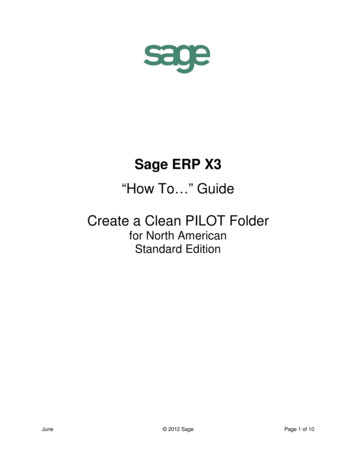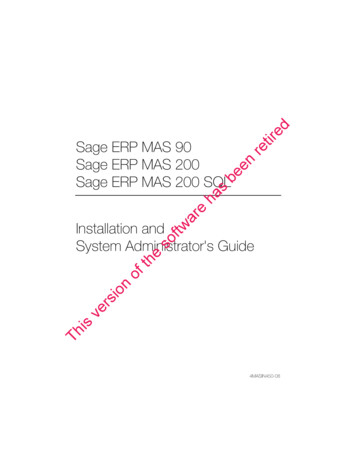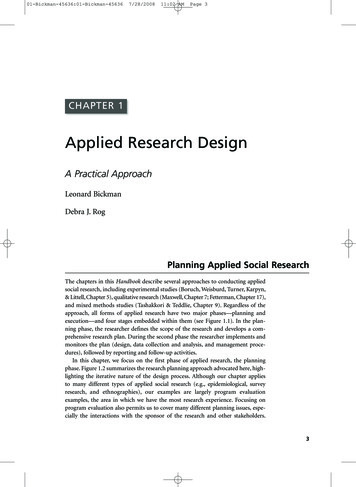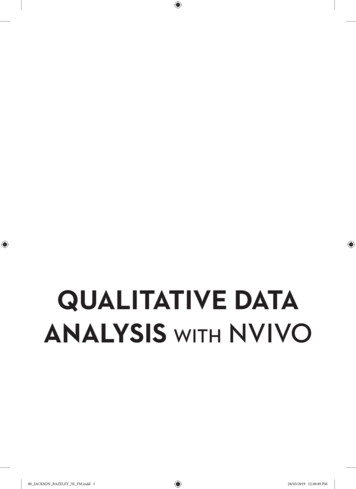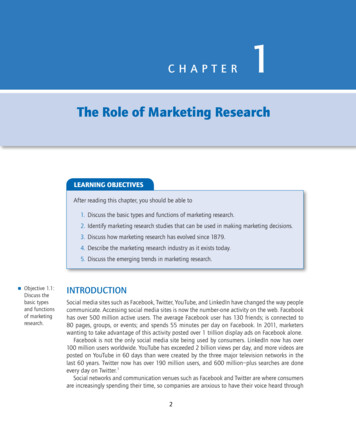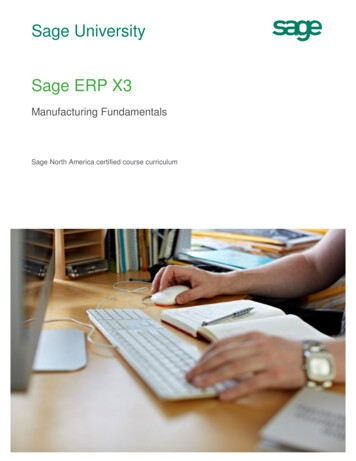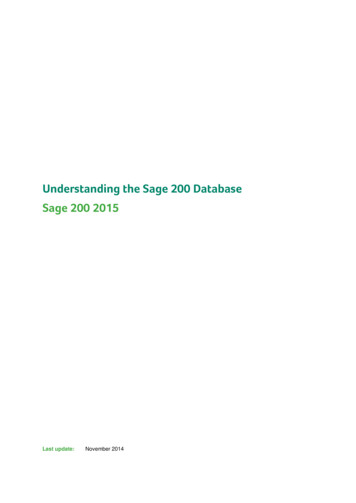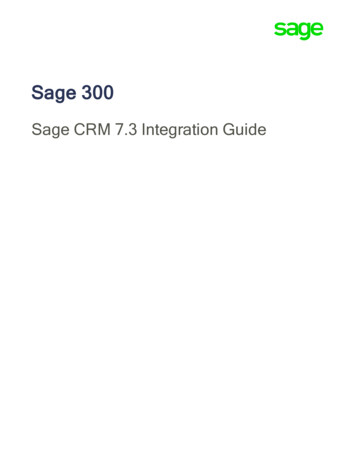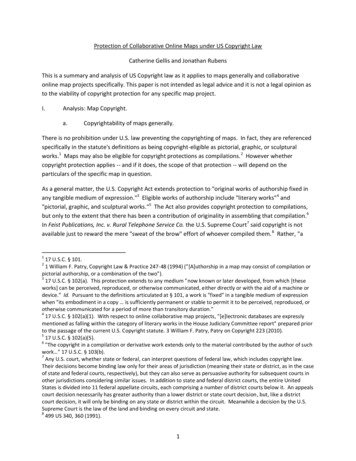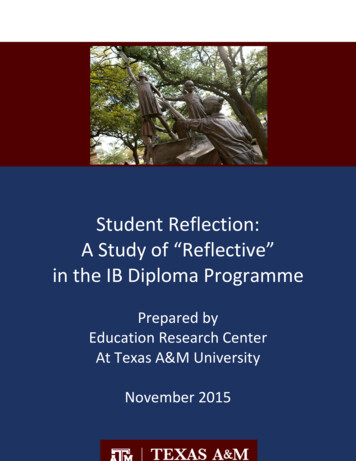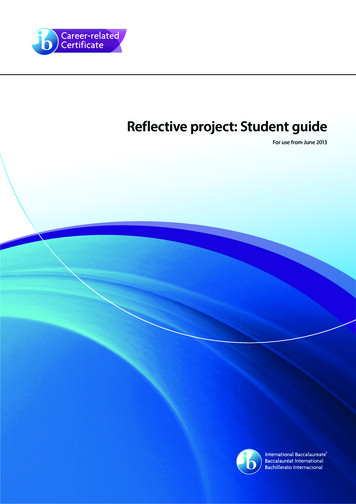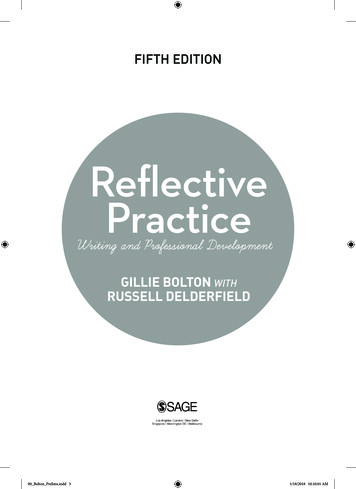
Transcription
FIFTH EDITIONReflectivePracticeWriting and Professional DevelopmentGILLIE BOLTON WITHRUSSELL DELDERFIELD00 Bolton Prelims.indd 31/18/2018 10:10:01 AM
SAGE Publications Ltd1 Oliver’s Yard55 City RoadLondon EC1Y 1SPSAGE Publications Inc.2455 Teller RoadThousand Oaks, California 91320SAGE Publications India Pvt LtdB 1/I 1 Mohan Cooperative Industrial AreaMathura RoadNew Delhi 110 044SAGE Publications Asia-Pacific Pte Ltd3 Church Street#10-04 Samsung HubSingapore 049483Editor: James ClarkAssistant editor: Robert PattersonProduction editor: Tom BedfordCopyeditor: Elaine LeekProofreader: Bryan CampbellIndexer: Martin HargreavesMarketing manager: Lorna PatkaiCover design: Sheila TongTypeset by: C&M Digitals (P) Ltd, Chennai, IndiaPrinted in the UK Gillie Bolton and Russell Delderfield 2018First edition published 2000. Reprinted 2003 (twice),2004Second edition published 2005. Reprinted 2008,2009 (twice)Third edition published 2010. Reprinted 2010, 2012,2013 (twice)Fourth edition published 2014. Reprinted 2015, 2017 (twice)Apart from any fair dealing for the purposes of research orprivate study, or criticism or review, as permitted under theCopyright, Designs and Patents Act, 1988, this publicationmay be reproduced, stored or transmitted in any form, orby any means, only with the prior permission in writing ofthe publishers, or in the case of reprographic reproduction,in accordance with the terms of licences issued bythe Copyright Licensing Agency. Enquiries concerningreproduction outside those terms should be sent to thepublishers.Library of Congress Control Number: 2017952666British Library Cataloguing in Publication dataA catalogue record for this book is available fromthe British LibraryISBN 978-1-5264-1169-3ISBN 978-1-5264-1170-9 (pbk)At SAGE we take sustainability seriously. Most of our products are printed in the UK using FSC papers and boards.When we print overseas we ensure sustainable papers are used as measured by the PREPS grading system.We undertake an annual audit to monitor our sustainability.00 Bolton Prelims.indd 41/18/2018 10:10:01 AM
Dedicated to all who heal, care and educate.Knowledge is limited. Imagination encircles the world.(Albert Einstein)Try to love the questions themselves like locked rooms and likebooks that are written in a very foreign tongue. Do not now seek theanswers, which cannot be given to you. Live the questions now.(Rainer Maria Rilke)00 Bolton Prelims.indd 51/18/2018 10:10:01 AM
00 Bolton Prelims.indd 61/18/2018 10:10:01 AM
ContentsAbout the AuthorsForeword, by Stephen BrookfieldPreface to the Fifth EditionAcknowledgementsNew to this EditionKey Terms (Glossary)Online Resources1 Reflective Practice: an IntroductionDonald Schön’s Swampy LowlandsSeeking a RouteReflection-In- and On-Practice: Our Map for theSwampy LowlandsReflection and Reflexivity: DemystificationReflective Practice: a Political and Social ResponsibilityValuing diversityMaking Sense of ExperienceBlocks and Limitations to ReflectionUnderstanding the Name: Reflective Practice2 Values and Principles of Reflective PracticeWhat Are Ethical Values?Values and Principles of Reflective Practice00 Bolton Prelims.indd 18 10:10:02 AM
viii Reflective practiceCertain Uncertainty; Serious Playfulness; UnquestioningQuestioningEthical RelationshipsEthics and StudentsEthics and Clients etc.Challenging EmotionsReflective Awareness: Responsibility, Authorityand BoundariesMindfulnessForgivenessRisk and SafetySafety, Risk and Boundaries on a Master’s CourseFocus on Reflection3 Theories and Contexts of Reflective PracticeTheories, Frameworks, Models of Reflection: ExplanationsAltering Critical PerceptionSingle and Double LoopsCycles and SpiralsStructured QuestionsHierarchical and Transformative ModelsTheories, Frameworks, Models of Reflection: ApplicationContexts of Reflective PracticePersonal Development Plans and Portfolios (PDP)E-portfoliosVideoAction Learning or ResearchMethods from the Arts and Other MediaDevelopmental Processes Involving Reflective Practice:SupervisionMentoringCo-peer MentoringPaying Attention4 The Power of NarrativeReflective Practice NarrativesNarratives of PracticeAutobiographical Reflective StoriesOur Storied NatureThe Relationship Between Life-as-Lived and NarrativeFrom Uncritical Storymaking to Critical Reflective Narratives00 Bolton Prelims.indd 870717375788083858891921/18/2018 10:10:02 AM
Contents ix5 PerspectivePerspective and Reflective PracticeThe NarratorOmniscient, Reliable and Unreliable NarratorsGhosts and Shadows from the PastPerspective and Truth; Fact and FictionClients’ Confidentiality and PrivacyUsing Genre to Develop PerspectiveFantasy, Folk Tale, Fable, MythWriting for ChildrenParodyPoetry6 The Power of MetaphorWhat Is Metaphor?Metaphor at WorkUsing Metaphor to Develop Reflection and ReflexivityImage and Reflection7 Writing as ReflectionWriting to LearnThe Discipline of WritingFinding the Writer’s VoiceWriting about Events, or Abstract MusingPerception and QuestioningReading and Sharing WritingSilenceReflective Writing and ArtistryWriting: an Ancient 81331351381401421441471501531541548 How to Do Reflective and Reflexive Writing157Introduction to Writing First Draft ReflectionsTrust the Writing HandSuspend Your DisbeliefHow to Start: the Five StagesStage 1: The Six-minute WriteStage 2: The Incident, Narrative, StoryStage 3: Read and RespondStage 4: Sharing Writing with a Peer(s)Stage 5: Developing Writing15715715815915916116516817100 Bolton Prelims.indd 91/18/2018 10:10:02 AM
x Reflective practiceReflective Writing for AssignmentsDeveloping the Five StagesListsUnsent LettersDialogue to Develop Aspects of OurselvesInternal MentorInternal SaboteurWriter’s Block9 Reflective Practice JournalsLogs, Diaries and JournalsThe Reflective Practice Journal: an ExplanationReflective Practice Journals and Ethical ValuesThe ThingTypes of WritingHow to Write: the Four StagesWhen, Where, For and with Whom to Write a JournalJournals as a Course ElementModelling Critical Reflexivity10 Assessment and EvaluationAssessment of Reflective Practice JournalsAssessment: Queries, Problems and PitfallsIssues with Grading Reflective and Reflexive WritingAssessment SolutionsEvaluation11 Reflective Writing and Team DevelopmentThe Growth of a TeamSome BoundariesMore Stories: EvaluationMore Team-Building 9319820020320520720821021121421922122222322412 Reflection on Reflection231ReferencesIndex24026300 Bolton Prelims.indd 101/18/2018 10:10:02 AM
1Reflective Practice:an IntroductionReflective practice is introduced and described, its social and politicalresponsibility outlined. Donald Schön’s theory that reflection-in-, andon-action are essential to inform us how to work in conditions ofuncertainty is outlined. Reflection and reflexivity, common blocks tothem, and how to discover just what each practitioner needs to reflectupon, are defined and explained.By three methods we may learn wisdom: first, by reflection, which is noblest;second, by imitation, which is easiest; and third by experience, which is thebitterest. (Confucius, quoted in Hinett, 2002, p. v)There are in our existence spots of time / whence our mindsAre nourished and invisibly repaired; / Such momentsAre scattered everywhere. (Wordsworth, [1880] 2004, p. 208)How can we develop the practitioner from the practice? (GB)How can we know the dancer from the dance? (Yeats, 1962, p. 128)Reflective practice is a state of mind, an ongoing attitude to life and work,the pearl grit in the oyster of practice and education; danger lies in it beinga separate curriculum element with a set of exercises. Brookfield calls it01 Bolton Ch-01.indd 11/18/2018 10:09:57 AM
2 Reflective practice‘a reflexive habit second nature’ (2009). It enables us to make illuminativesense of where we are in our own practice, and our relation to our profession and our institution: we don’t travel far with it. Yet it makes the differencebetween 20 years of experience and merely one year of experience repeated20 times (Beaty, 1997, p. 8).Reflective practice can enable (future) professionals to learn from experience about: themselves; their studies, their work; the way they relate tohome and work, significant others and wider society and culture; the waysocial and cultural structures (e.g. institutions) are formed and control us.Indeed, having the ability to reflect is a key element of employability intoday’s professions (Wharton, 2017). Professionals face complex and unpredictable situations; they need complex and diverse reflective and reflexiveprocesses. Engaging in these critically will be reflected in the quality of theirwork or studies (see Whelan and Gent, 2013). It brings greater unity andwholeness of experience to the practitioner and greater empathy betweenthem and their client. Job satisfaction will increase, and work-related stressdecrease (Alarcon and Lyons, 2011).Perhaps the most accessible form of freedom, the most subjectively enjoyed,and the most useful to human society consists of being good at your job andtherefore taking pleasure in doing it – I really believe that to live happily youhave to have something to do, but it shouldn’t be too easy, or else somethingto wish for, but not just any old wish; something there’s a hope of achieving.(Levi, 1988, p. 139)If it wasn’t for reflective practice, [stuff] would undoubtedly go around andaround in my mind.It is much more helpful to get it out of my head and onto the paper and lookback.I feel I can genuinely ask my clients, ‘unpick unpick unpick, cry, open up’ because I have done it, I know what I am asking you to do is really difficult,but I also know that it is a really helpful.You relate the clinical work to the theory in reflective practice, and that givesyou that 360 knowing, ‘now I understand what the book is talking about’.(Reflective practitioners quoted in Collins, 2013, pp. 54, 83, 84, 88)Reflective practice can give strategies to bring things out into the open,and frame appropriate and searching questions never asked before. It canprovide relatively safe and confidential ways to explore and express experiences otherwise difficult or impossible to communicate. It can challengeassumptions, ideological illusions, damaging social and cultural biases,inequalities; and it questions personal behaviours that perhaps silence the01 Bolton Ch-01.indd 21/18/2018 10:09:57 AM
Reflective practice: an introduction 3voices of others or otherwise marginalise them. This book consistentlyenables enquiry into: what we know and wish or need to explore furtherwhat we know but do not know we knowwhat we do not know and want to knowwhat we think, feel, believe, value, understand about our role andboundarieshow our actions match up with what we believehow to value and take into account personal feelings.Practitioners explore and experiment with difficult areas of experience,such as: how to perceive from others’ perspectivehow to value others’ perspective, however different they are from uswhat we can change in our context; how to work with what we cannotchangehow others perceive us, and their feelings and thoughts about events,and our actionswhy we become stressed, and its impact on life and practicehow to counteract seemingly given social, cultural and political structures.We know a great deal more than we are aware, absorbing informationunwittingly. We have challenging material shoved into boxes mentallylabelled do not open. We have not celebrated and learned from positiveexperiences (Ghaye, 2011).Donald Schön’s Swampy LowlandsSchön (1987) described professional practice as being in a flat place wherewe can’t see very far. Everyone would love to work on a high place fromwhich all the near valleys and far hills are in view. Everyday life, work andlearning rarely have signposts, definitive maps, or friendly police to helpwith directions. The teacher in the classroom, clinician in the consultingroom, healthcare professional with a patient, social worker in the client’shome, lawyer with a tricky issue, member of the clergy, or the policeofficer themselves, relies on knowledge, skills and experience, and whatthey can glean quickly from immediate sources. Each one is rarely certainwhat is needed now. We cannot stand outside ourselves and our work(from the cliff), in order to be objective and clear. We work and learn in01 Bolton Ch-01.indd 31/18/2018 10:09:57 AM
4 Reflective practicethe ‘swampy lowlands’ (Schön, 1987) by trial and error, learning from ourmistakes. Everyone gets it wrong sometimes and has to live and work withthe consequences.Reflective practice makes maps. Everyone needs thorough methods tosort through and learn from muddles, uncertainties, unclarities, mistakesand anxieties. All need to perceive hitherto unnoticed issues, which willotherwise cause greater and greater problems. How do we know whichway to go, to avoid sinking into Schön’s bog? How do we know whichunclear path to take at a junction as they all seem to lead further into theswamp?I remind us of Schön’s powerful image because we cannot climb out ofthe lowland, but do the best we can down here. There often seems no clearreason for choosing this path through tussocks or that one over a muddystream. What and who can we trust here? That bright green grass looksinviting, but I sink up to my knees in water. What is my compass?We do have compasses and maps: Schön (in Argyris and Schön, 1974)called them our theories-in-use, which he said we develop within ourpractice as ‘a conversation with the situation’ (Schön, 1983, p. 76). Butthese maps are indistinct because they are tacitly rather than consciouslyused: our actions are governed by habitual patterns and ways of being.We use our theories-in-use unwittingly. If I were questioned about anaction I would respond with espoused theory which I have thought out,but is possibly at variance with what I actually do.So to develop my practice, gain greater effectiveness, I need to observe andunderstand my theories-in-use, what I actually do, alongside my espousedtheories, what I believe I do. And as far as is practically possible I need tobring these into congruence (close to being the same thing). What equipmentcan I rely upon in this foggy swamp? Where, when and how do I begin?I begin with reflective practice. We really are thrown onto our ownresources in the everyday work and study environment, and have to trustwhat equipment we have: reflective practice can provide the very best.Schön said the process of trial and error and learning from mistakes is artistry. The reliable map and accurate compass are reflection and reflexivity.Schön gave us the swamp image because he knew that all educationrequires entering a place of not-knowing, of having to ask significant questions to find out. The traveller on the educative journey through difficultterrain has to trust their few pieces of equipment. They might have helpersalong the way, but no definitive guide. Being guided with certainty throughthe swamp would not be educative.We learn by doing, through the very struggle to make our own judgements, not by being told where, when and how to turn, who to trust and01 Bolton Ch-01.indd 41/18/2018 10:09:57 AM
Reflective practice: an introduction 5what is the correct path. The reflective educative process is one of eachindividual constantly asking why of everything, from the individual case tothe running of the whole organisation. Albert Einstein ([1929] 2002) wassuccessful partly because he doggedly and constantly asked questionswith seemingly obvious answers. Childlike, he asked why?, how?, what?,rather than accepting givens or assumptions. He had the confidence tostay with and be open to: ‘love[ing] the questions themselves like lockedrooms’, and certainly ‘liv[ing] the questions’ (Rilke, [1934] 1993, p. 35).There are no single answers to ‘How could I have done better?’ Yet morequestions arise instead, such as ‘If I had done this, which I think wouldhave been better, what would the patient/doctor have felt?’ Answers tendto put a stop to the enquiring process; more and more pertinent questionstake us deeper (see David et al., 2013). As Master’s student Ann commented: ‘No wonder it all takes so much time!’ Exploring issues in depthand width can take time. Though enlightenment can arrive after 15 minutes’writing, as you might discover here.Now might be a good time to check out what reflective practice writingis. You can find a quick summary in the online resources.Visit https://study.sagepub.com/bolton5e.Write to LearnYou may have noticed this in the Preface of the book. Each chapterincludes Write to Learn. These exercises can take very differentlengths of time. Some are very affirming, some challenging; all result inpositive writing. Each can be done individually or by a facilitatedgroup: many are useful for initial group forming. See Chapter 8 formore advice on starting writing. For now: This is unplanned, off-the-top-of-the-head writing; try to allowyourself to write anything. Whatever you write will be right; there is no critic, red pen poised. All that matters here is the writing’s content; if you need to adjustgrammar and so on, you can – later. Ignore the Inner Saboteur who niggles about proper form andgrammar, or says your writing is rubbish. This writing is private, belongs to the writer, who will be its firstreader.(Continued)01 Bolton Ch-01.indd 51/18/2018 10:09:57 AM
6 Reflective practice No one else need ever read it, unless the writer decides to shareit with trusted confidential other(s). Before doing any of the exercises here, or in other chapters, do asix-minute-write about anything to limber up before starting (seeChapter 8). Reread all the writing with care and attention before reading it outto anyone. Writing can then be shared fruitfully with another or a group, if thisseems appropriate.Advice for facilitatorsIt helps the process if: each writer reads silently back to themselves before reading to agroup or partner each person knows at the start they will be invited to read out everyone is offered the option of not reading if it feels inappropriate you know that many exercises occasion laughter, some tears: bothare fine a facilitator gives instructions in numbered order participants finish writing each section before hearing the next minimal explanations are given: people usually ‘play the game’ ifthey trust the facilitator.Visit https://study.sagepub.com/bolton5e for more tips and resourcesTry this next exercise to get you started.1.1 Names1.Write anything about your name: memories, impressions, likes,hates, what people have said, your nicknames over the years:anything.2. Write a selection of names you might have preferred to your own.3. Write a letter to yourself from one of these chosen names.Seeking a RouteRoute-finding equipment or information can only help when the travellerknows their destination. One cannot find the solution without havingidentified the problem accurately and precisely. This is the conundrum of01 Bolton Ch-01.indd 61/18/2018 10:09:57 AM
Reflective practice: an introduction 7reflective practice. We want to become good experienced practitioners.But to do this, we have to discover which specific areas of practice weneed to improve, and why. We find out by exploring, experimenting anddiscovering, with uncertainty as the central paradox. Dewey (1933a) saiddoubt and uncertainty is an essential element of effective reflection.Focusing upon personal beliefs, theories, values-in-use, and reflectingupon them, is tricky. So much we have always thought or believed is takenfor granted – ‘everyone in my workplace thinks this way’. The very structure of language creates assumptions about things being immutable: this
(Reflective practitioners quoted in Collins, 2013, pp. 54, 83, 84, 88) Reflective practice can give strategies to bring things out into the open, and frame appropriate and searching questions never asked before. It can provide relatively safe and confidential ways to explore and expres
